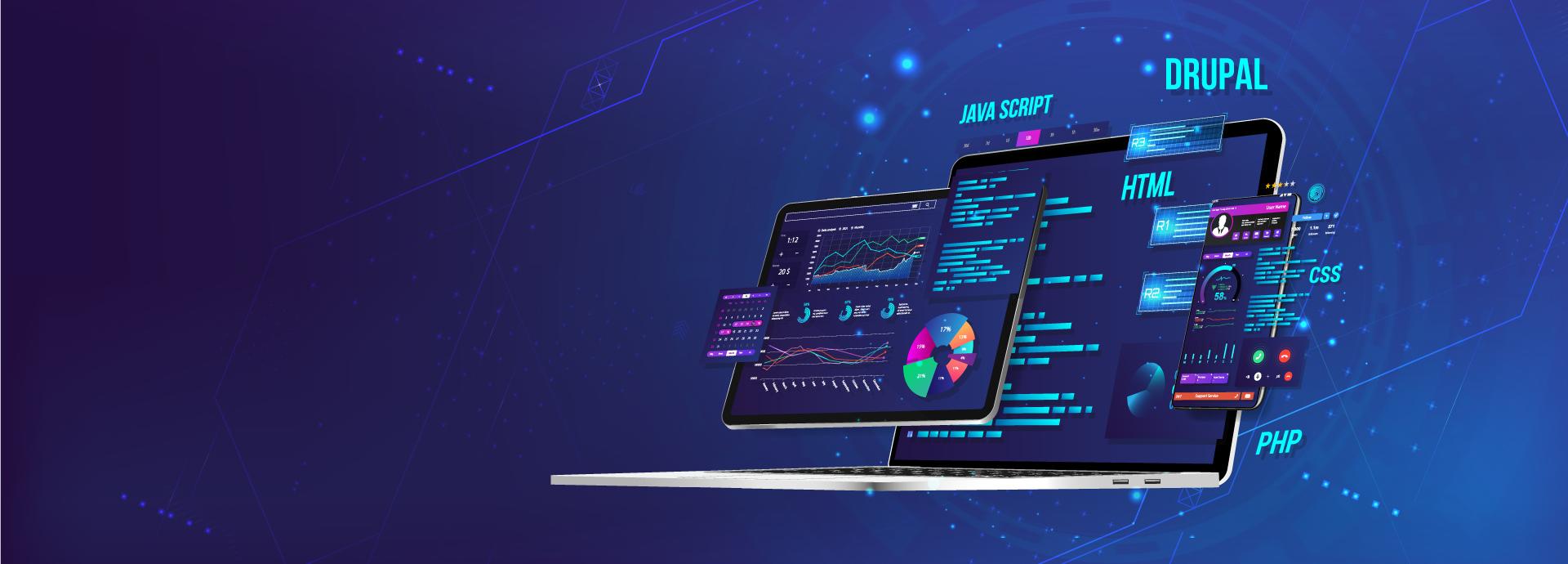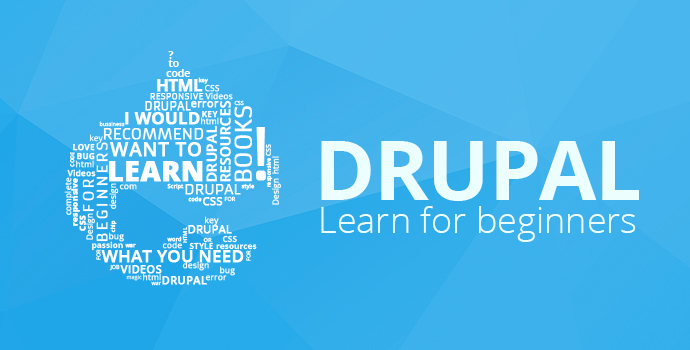As a new user, you might have been in a place where you are struck with the common fear that how you should start with Drupal and that what resources you should find.
It’s easy to be overflowed among a sea of information if there’re no guidance. Of course you don’t need a perfect road map to start. But knowing the direction helps you make a more rapid acceleration on the learning path.
What You Need?
A dedication to learn
Make a commitment to learn Drupal. Just one or two hours a day will get you ahead long in the future. You won’t be skilled if Drupal seems to be a CMS to play around in your leisure time. If you are really interested Drupal , and want to work as a developer, or as a Drupal site builder, making a commitment to work and educate yourself on a daily basis is never underrated.
Prior coding skills?
You don’t need to know html/css, php, etc to start with Drupal. Of course, if you do, you’ll get further than a new user without technical skills. For Drupal developers, it is necessary. But for a normal user using Drupal as a CMS, you don’t need to.
Getting started
Well begun is half done
Aristole
I don't think you need to have a great beginning, just start. I've recalled how many times I tried to learned new things, but postponed. Make an incentive, whether buying a video subscription, getting a book, call a Drupal developer friend to help you immediately. If you are willing to learn Drupal, push it. Give yourself a firm reason to start.
Drupal Resources
"You must understand that there is more than one path to the top of the mountain"
Miyamoto Musashi - The invincible Japanese samurai in the 16th century
In fact, there are a lot of resources for you to begin with Drupal. I don't say what is more important than others. You can learn by reading books, and work on your sites. You can start by watching some video tutorials. You can begin by crawling on Drupal.org. They are all fine. Whatever resources you follow, the end in mind is to become efficient with Drupal. You can learn with only one resource at the beginning. But I'll recommend you to combine all of them together to get the best of your Drupal learning. But don't get overwhelmed. I'll list all the resources here.
Drupal.org
This is the first and foremost resource that comes to my mind. There exists a variety of materials: themes, distribution, modules, forums support... . It is no doubt the largest resource about Drupal. And there is a great community here with discussion, group, support.
This place also holds lots of Drupal beginner guides. Some tutorials for starters. Here and here
The problem is that there are so many materials, one can be perplexed as a first time Drupal user. This is the best place to download all Drupal installations, modules, themes,..., but when it comes to learning, you have to try to distinct among so much noise. You must try to separate the wheat from the chaff.
Books
I don't recommend you to read some books right away when starting because it takes more time than other resources. If you want, They're still a great resource. For beginners, starting with these books will get you a clear and detailed look about Drupal. Reading books will give you an overall and in-depth view of Drupal. Something that videos, and online tutorials will not compare. Because the authors sat down, and tried to sum up the best of his knowledge and experience to get into a book.
Recommendation for beginners
-
Using Drupal
This is a good introduction to the Drupal 7 CMS. This book assumes that you have no knowledge with Drupal, and get you to know the basics. It’ll help you to understand the CMS, how to set up common functionality, etc. -
Drupal for Dummies
You may shudder hearing this book. But it does give beginners a very rudimentary look about the CMS in a fast and funny way. You’ll learn about this CMS, its features, how to create, manage content, install modules, activate themes,... -
Drupal 8 for Absolute Beginners
If you want to get your hand on Drupal 8 immediately, this book will give you enough basic knowledge to work with the latest Drupal version.
Books for Drupal developers
-
Pro Drupal 7 Development
If you want the only ONE book for developers, I would recommend this one. This book covers detailed knowledge of Drupal core, how Drupal works, how to build a module, how to create theme, the api and much more. If you want to dig deep into Drupal development, Pro Drupal 7 development is a great reference. -
Drupal 7 Module Development
If you have got some familiarity with Drupal site-building, and want to take your power to the next level, this is a good one. The book breaks down in details the factors related to creating modules and others (database interfaces, theming, administration) and how they all work together. -
Drupal 7 Themes
As a name said, it is a good introduction for someone who really want to start with Drupal theming. By the book, you’ll learn how to make Drupal look prettier. You’ll get knowledge about the Drupal 7 theming Architecture, how to set up a theme, create new themes, modify existing ones, etc.
If you want more, you can find other Drupal books via here
Videos
Many people prefer videos because it’s very fast to learn something. Drupal is hard to grasp if you don’t see it first hand. That’s when videos make an advantage. It’s easier to learn if you can simultaneously see and hear an experienced Drupal developer trying to guide you with a Drupal topic. Let's dig into the video places.
-
Udemy One of the most popular online training programs on the Internet. I have got some good feedbacks from some of my Drupal developers friends who subscribed here. You can learn the Drupal 7 course, or the latest Drupal 8 version here
-
Drupalize.me They say that there are presently 1188 videos onsite with 321 hours of training. It is one of the largest videos resources via subscription to learn about Drupal.
-
BuildaModule.com Another great place to learn Drupal via subscription. It gives you a step by step video tutorial to start with Drupal.
-
Youtube Youtube is free, but you need to spend a fair amount of time searching for what you need. There’re so many Drupal tutorials here.
If you want to have some basic tutorial about Drupal on Youtube, I recommend you watch the first 4 parts of this series here.Let's ignore the video titles. Although it’s for building an ecommerce sites, the first 4 parts do a good job of giving you basic guide to installation of Drupal. And the rest 6 parts is for building an ecommerce site with Ubercart.
Say you're struck into a Drupal issue. The fastest way to get it solved is to type the keyword in the search engines. You’ll find almost what you need through the results on Drupal.org communities, Blogs, Youtube,... Learning has been made much easier in Google era.
Group Meetings
Why not mingle in the seminar, and conferences for Drupal users & developers in your place? Asking for advices, exchanging ideas, listening to talks from senior developers are a great boost to your learning with Drupal.
What do you learn Drupal for?
To make the most of your learning path, you have to know what your purpose for pursuing Drupal is. And to the best of my knowledge, there are 4 flavors of orientation that Drupal users have followed:
- To become a Drupal developer
- To be a Drupal themer/ To make Drupal look prettier
- To use Drupal as a site builder/webmaster
- To use it as a quicksilver Drupal user
Developers
They are the ones who have a deep knowledge about this CMS. They will do any customization to fit their needs. They can overwrite any theme. They are those who can customize the modules to their purpose. And if there are no useful modules that they need, they can write their own ones.
The path to Drupal developers require you to learn Drupal well. Find good resources mentioned above. Watch tutorial, read Pro Drupal Development. Learn about the Form API.
Themers
Themers get your Drupal site to look prettier. Besides knowledge about the CMS. They have to have an efficient level of html/css, js to work with. You can learn basic theming. Read Drupal 7 Themes or Drupal 8 theming
Find some good frameworks to begin theming. There are Bootstrap, Zen theme, Omega theme. Among them, we favor Bootstrap. Most themes on our sites are built with Bootstrap. It is a modern framework to Drupal theming
And you can get some free themes on Drupal.org, or purchase some premium themes to know what’s inside the themes you like.
Site Builders
Site builders have a great knowledge of their Drupal site. They are the webmasters of their own website, or their clients. They will do anything to get the site they want, getting some functionalities by installing modules, changing the content, customizing the website forms. They alter the website appearance, cssing it if their sites don’t look nice. They build websites for themselves, for customers.
If you follow this path, you need to learn to set up the website on your own. Learn to get what Drupal can and cannot do. Try to work with some projects. Build the content, install and test modules,... You need to build, break, and rebuild many websites to become a good Drupal site builder.
Quicksilver users
By quicksilver users, I mean the ones who are curious about Drupal. They just want to learn what Drupal is, and try playing around with it. They may not have any coding skills. They are the ones who use website for their business, or for fun. If there are some functions of their website that they want, they will try to learn to implement. If they cannot, they may ask a Drupal developer to do it for them.
If you’re the ones, get to know some basic knowledge about Drupal will help you use Drupal well.
That’s it. It’s my experience and some suggestions for someone who really wants to start with Drupal. If you have something that you think will help people with their Drupal learning, let me know and leave a comment below.

